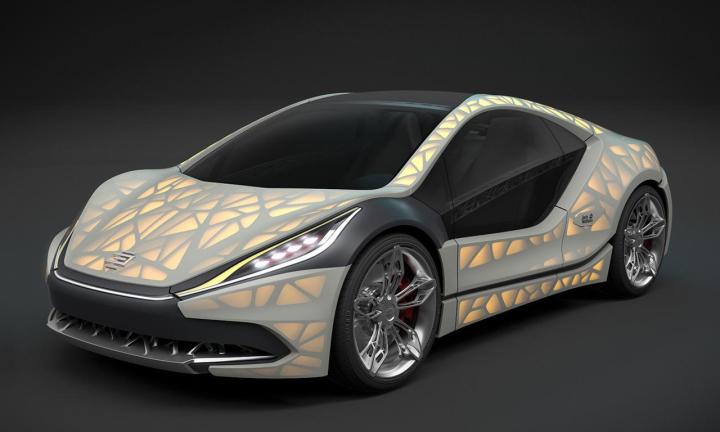
The Fulda automaker has just announced its ‘Light Cocoon’ sports car, which uses a leaf-life membrane stretched over a featherweight skeletal structure. The two-door’s backlit appearance gives it a look that’s part scaly reptile and part cracked sandstone, but according to the group, the goal is truly lightweight construction.
Outdoor apparel supplier Jack Wolfskin designed the car’s weatherproof skin, called Texapore Softshell, and claims the textile is four times lighter than standard copy paper.
“Even if it sounds futuristic to begin with, this approach has a its own special appeal,”said EDAG Chief Technology Officer Jörg Ohlsen. “Weighing no more than 19 g/m², the Jack Wolfskin material supports maximum lightweight design requirements with minimum weight.”
The car’s bionic structure could revolutionize the way cars are made, as it uses a 3D printing process that eliminates any material not needed for load-bearing purposes. There are obvious safety concerns with this style of production, but EDAG’s concept is more about experimentation and discovery than on-road practicality.
“We are pursuing the vision of sustainability – as demonstrated by nature,” explains the firm’s head designer Johannes Barckmann. “The result: the EDAG Light Cocoon presents a stable, branch-like load bearing structure from the 3D printer, which only uses material where it is absolutely necessary.”
EDAG has released no powertrain information at this time, but the car is scheduled to premiere at the 2015 Geneva Motor Show in March.
The company, who also works in aviation and spaceflight, released the GENESIS Cockpit Concept earlier this year.
GENISIS is a 3D-printed driver module with a focus on safety, one that takes inspiration from the skeleton of a turtle.
“There is still a long way to go before this becomes an industrial application,” the brand admits, but EDAG says the concept could act as symbol for the engineering freedoms of additive manufacturing.


